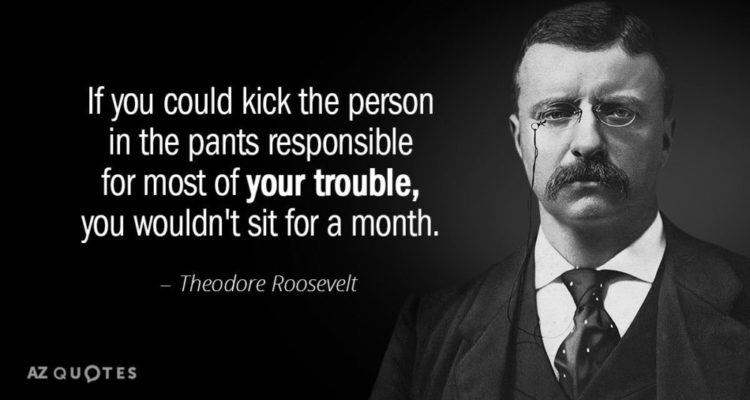Opening the Pandora’s Box
Presidential Military Power – Part 3
I believe that war should never be resorted to when, or as long as, it is honorably possible to avoid it. I respect all men and women who from high motives and with sanity and self-respect do all they can to avert war. I advocate preparation for war in order to avert war; and I should never advocate war unless it were the only alternative to dishonor.
Theodore Roosevelt, “America the Unready”, Theodore Roosevelt, An Autobiography, 1913
A democracy like the United States assumes unique risks in an anarchic and hostile world. As a free people, we accept a higher vulnerability to attacks like 9/11 as the price of maintaining our freedoms. Once war is declared, we then accept the casualties, both to our soldiers and our values, but only for the limited period necessary to win the war. The gravity of both types of loss demands that the decision to go to war be made not just by one person, but by the nation pursuant to the open debate envisioned by the Founding Fathers.
I outlined the deficiencies of the current War Powers Resolution in a previous post in this series. The law desperately needs to be updated to distinguish between different threat levels and to address new types of warfare. First, we should recognize that not all warfare requires the same level of congressional scrutiny. An attack upon the American homeland and a first strike against a foreign state or its leaders should be subject to a significantly higher level of congressional consultation and review. These should be considered “major conflicts” under the law. In contrast, retaliation against overseas attacks, peacekeeping actions and other types of conflict should continue to be covered, but require authorization under the current level of scrutiny.
The law also should apply to clandestine warfare such as cyber-attacks and low level actions such as drone attacks. Since military action will not always be the appropriate response to these kinds of attacks, presidents should be able to seek non-military responses such as trade sanctions, diplomatic or other actions in a new type of resolution called an Authorization of Action (AOA), which would also apply to military action. To prevent endless wars, AOA’s should be automatically limited to no more than three years in duration absent a vote to renew the authorization or a declaration of war. AOAs should also be directed at a specific state and not at a private organization or type of warfare as was the 2001 authorization.
However, history shows that no change in the scope of presidential war powers will effectively restrain president military power without an enforcement mechanism that forces Congress to act and take responsibility for the situation. Next to the war-making power, the most important power of Congress is the power of the purse – it’s authorization and appropriation of federal dollars. Current law and budgetary practice grants broad authorization to the Pentagon to spend money to support our military in the field – a necessary tool, but one that can be abused. To prevent this, the law should provide that, notwithstanding any other law or appropriation, the President is not authorized to spend money on an action requiring an AOA after the 60-day deadline for congressional authorization.
Finally, since major conflicts inherently expose the nation to greater risk, they should require more congressional consultation and an enforcement mechanism that makes it equally risky for presidents to ignore the process. To achieve this, the role of the “Gang of Eight” congressional leaders should be formalized and strengthened. If the President engages in a major conflict without proper consultation and authority, any four of the “gang”should have the power to force a record vote on impeachment of the president in the House of Representatives or a censure resolution in both the House and Senate. For example, these standards would have triggered such consultation and review not only for the Soleimani killing, but also the Russian hacking campaign against the 2016 election.
Critics of these reforms will complain they tie the President’s hands in the prosecution of a war. If a conflict is truly momentous enough to give the commander-in-chief wide-ranging power to prosecute it, there is a clear solution – seek and obtain a formal declaration of war. At the other extreme, advocates of clandestine warfare will claim that applying the same authorization standards to lower profile cyber and drone attacks would unnecessarily expose our capabilities and risk spiraling the conflict into a shooting war. Granting the President the right to seek a non-military response, however, lessens this threat, informs the American public of it and enlists their support in combating the threat. It also would prevent the secret wars the act was designed to prevent and whose very existence also creates a risk of escalation.
TR‘s most famous saying was “speak softly and carry a big stick”. The most important element of this “big stick” was the knowledge that the American people would fight a war to a victorious conclusion. At the same time, he knew from personal experience how horrible war could be and was proud no American service man died in combat during his presidency. A realistic and restrained foreign policy assumes the costs of war only in those rare instances when the national security is directly in danger and thus when public support is more likely. Those are exactly the wars America can and should win. These reforms to the War Powers Resolution would help limit our wars to only those kinds of necessary conflicts.


